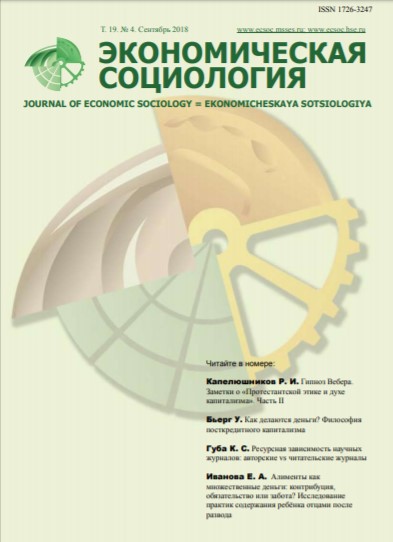Weber’s Hypnosis
Notes on “The Protestant Ethics and the Spirit of Capitalism”. Part II
Abstract
The paper is the second part of a two-part critical essay on the discursive methods used by the great German sociologist Max Weber in his classic study on relationship between economy and religion The Protestant Ethic and the Spirit of Capitalism (1904–1905). As is well known, the only pieces of empirical evidence that Weber used to verify his Thesis were estimates of the differences in school enrollment between pupils from Protestant and Catholic families in the German state of Baden at the end of the nineteenth century, as provided by M. Offenbacher. These estimates implied that Protestants tended to choose “market” education, while Catholics chose “non-market” types of education. However, this conclusion is based on Offenbacher’s arithmetic error, such that, after its correction, all differences in educational preferences between the two groups (and hence differences in their work ethics) simply disappear. Analysis also suggests that the “Protestant ethics,” as it was interpreted by Weber, is a deeply dualistic concept; de facto, he attributed (for unclear reasons) one type of ethic to workers and an entirely different one to entrepreneurs. The Protestant Ethics discusses in detail the life and ideas of B. Franklin, who was, for Weber, an archetypical bearer of “the spirit of capitalism.” But this is a fundamental misinterpretation, as all of Franklin’s biographers argue. A more serious problem is that the Weberian analytical scheme contradicts the available historical statistics: it implies that, due to the proliferation of “the spirit of capitalism” in England, the pace of capital accumulation in the country in the seventeenth to eighteenth centuries should be very high, while in reality, it was much lower than in other Western European countries. Finally, various attempts to test Weber’s Thesis with the help of modern econometric techniques have mostly failed. The author concludes that Weber’s exegetics of religious texts are entirely or at least partially incorrect, that his claim about the significantly higher economic achievements of Protestants as compared with Catholics is not confirmed empirically, that his concept of “the spirit of capitalism” suffers from unavoidable internal contradictions, that his portrait of B. Franklin has almost nothing in common with the actual man, that his attempt to explain the quick accumulation of capital in England in the seventeenth to eighteenth centuries deals with non-economic phenomena, and that the results of current empirical studies are mostly unfavorable for Weber’s Thesis. However, the Weberian idea about the origin of “the spirit of capitalism” from “the Protestant ethics” has so strong a hypnotic power over human minds that their phantoms will, for a long time yet, excite the imagination of academic researchers and permeate mass media













